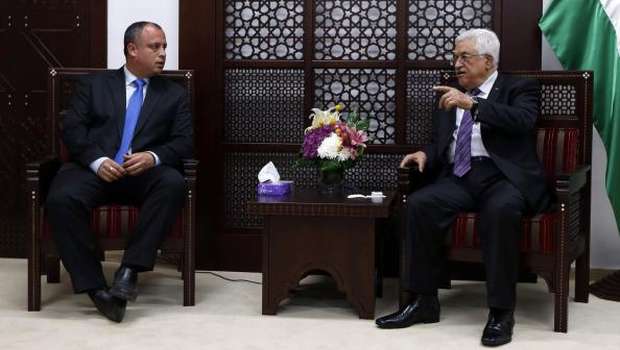
Palestinian President Mahmoud Abbas (R) meets with Israeli parliament member Hilik Bar in the West Bank city of Ramallah April 16, 2014. (Reuters/Mohamad Torokman)
Sources with knowledge of the agenda of the PLO’s Central Committee, speaking to Asharq Al-Awsat on condition of anonymity, said its 26th session in Ramallah on April 26 and 27 will decide the fate of the PA, the body set up after the 1993 Oslo Accords to grant the Palestinian territories a degree of self-rule.
The sources said: “The negotiations with Israel, the reconciliation with Hamas, the general elections, and the issue of disbanding the [Palestinian] Authority, are all on the agenda of the session, and important decisions will be made.”
The Central Committee, when in session, is the highest legislative authority in the absence of the suspended Legislative Council. The Central Committee includes the head and members of the Executive Committee, and representatives of Palestinian factions, as well as student, women, teachers’ and workers’ unions, in addition to six observers.
The nature of the decisions taken by the Central Committee in its forthcoming meeting will depend on the results of the negotiations between Palestinian and Israeli negotiators—which are expected to conclude ahead of the scheduled date of April 29—and the result of the reconciliation talks between the Palestinians.
Sources said the PLO’s Central Committee would have to decide between two courses of action in its quest for statehood.
“If the negotiations [with Israel] reach a dead end, the Committee will be faced with two options,” one source said. “The first is to dissolve the [Palestinian] Authority and force Israel to face up to its responsibilities towards the occupation of Palestine, and the second is to immediately join the 48 international organizations and charters, including the Rome Statute, which would allow the trial of Israeli civilian and military officials.”
Palestinian President Mahmoud Abbas told Israeli Knesset members last week he was ready to dissolve the PA if the current stalemate in the peace talks continued.
If the independent Palestinian government is shut down, Israel will be forced to re-assume the political and financial costs of the administrative control of Palestinian territories it ceded to the PA as part of the 1993 Oslo Accords. The bulk of the funding for the PA’s administration of the West Bank is currently supplied by international donors.
Observers say it is also likely that Palestinians would agitate for full civil and political rights while under direct Israeli rule, including the right to vote.
Abbas told the MKs: “I will surrender the keys of the Authority to the owner of the five-star Hotel [a reference to the head of the Israeli occupation’s civilian administration in the West Bank] who interferes in Palestinian affairs, just as in the days before the establishment of the Authority.”
Abbas added: “I do not need [Israeli Prime Minister Benjamin] Netanyahu or the chief of staff; just let me see a junior officer and I will hand him the keys of the Palestinian Authority. They’re welcome to take over the administration, and I will leave immediately.”
The dissolution of the PA is not a new idea, and has been aired a few times in recent years by Abbas. One source said: “The idea of dissolving the PA seems like suicide, but the situation cannot continue as it is.”
The Central Committee will listen to Abbas’ ideas regarding the future of the PA and his own personal future, as he is expected to reaffirm his intention to step down as president and his decision not to run in subsequent elections.
The Central Committee will also have to discuss the legal standing of the president and the Legislative Council, because their terms have expired. It was the Committee which decided in 2009 to extend the terms of the president and the Legislative Council when they expired, until elections could be held.
The issue of the elections will be the second major issue on the agenda of the meeting of the Central Committee.
According to the sources, the Committee will consider a report by Ahmad Azzam, the official in charge of the reconciliation dossier with Hamas, following his visit to Gaza.
The sources said: “If Hamas agrees on the elections, we will all go for it, but if it does not, the Central Committee may make a decision to hold the elections with whoever is available.”
Fatah sources insisted there were a number of ways to hold elections without the participation of Hamas, which currently controls the Gaza Strip, including the use of a system of proportional representation which takes the whole of the Palestinian territories as a single bloc, holding the elections in the West Bank and a second round in Gaza at a later date, or finding a way to enable whoever wanted to participate from Gaza to vote.
Hamas has rejected the idea of the elections without its participation. Spokesman Salah Bardawil said: “No elections [should be held] in one part of the country without other parts, and no elections [should be held] in Gaza without Jerusalem or the West Bank and vice versa. Elections must be held at the same time.”
Bardawil denied that Hamas objected to fresh elections on principle. A PLO delegation was expected to visit Gaza in the middle of next week to resolve the issue.
The task of the delegation will be to reach agreement with Hamas on the immediate implementation of reconciliation agreements that have been thrashed out by the two sides, including the Cairo Agreement and the Doha Declaration.
The two movements previously agreed to form a temporary government led by Abbas for six months, which was tasked with holding general elections in the Palestinian territories. However, disagreements between the two camps led to the process being suspended.
The Committee will also discuss a number of other issues, including the PA’s finances and the Palestinian presence in Jerusalem, which both Israelis and Palestinians claim as their capital.
